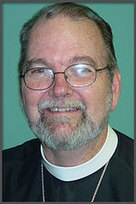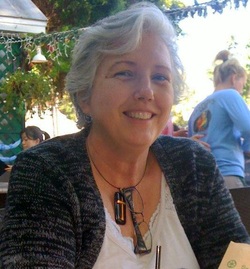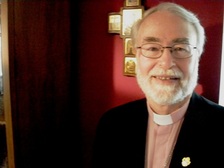 A lot of anger has been expressed in the stories from Scripture over the last few days. And it reaches its zenith today. Jonah is angry that God is not pursuing the destruction of Nineveh for its wickedness, and goes into a sulk. Jesus tells the Parable of the Wedding Feast in which, when the guests decline his invitation, the king is so furious that he sends his army to wreak havoc on them. What do these tales tell us about how we act…and about how God acts?
Truly, we all get angry about things over which we have no control: traffic jams, sudden illness, global war, people who cut in line at the grocery store. And there are times when our anger is seemingly justified: abuse, racism, acts of cruelty, wasteful behavior.
In Matthew’s parable today, the King changes his mind from gracious host to violent enforcer because of the actions of others. In the reading from Jonah, the prophet moves from being the champion of God’s justice to being angry with God because of a divine change in behavior. Jonah’s indignation is the result choosing to separate himself from God’s ultimate plan and God’s nature of being gracious and compassionate (Jnh 4:2). Unlike Abraham, who bargains with God when God wants to destroy Sodom, Jonah remains resolute in his hope that God will vanquish Nineveh.
One of the learnings here is that God is God, and we are not. If God chooses to forgive, to pardon, to restore, who are we to become upset that the divine will and ours are not in synch? As we learned while reading the Book of Job, the ways of God are mysterious and sometimes unknowable. But in the last two verses of Chapter 4, we see God’s true heart of love and care and compassion:
God said, “What’s this? How is it that you can change your feelings from pleasure to anger overnight about a mere shade tree that you did nothing to get? You neither planted nor watered it. It grew up one night and died the next night. So, why can’t I likewise change what I feel about Nineveh from anger to pleasure, this big city of more than 120,000 childlike people who don’t yet know right from wrong, to say nothing of all the innocent animals?” (The Message)
Are we willing to see things differently? Are we willing re-think our actions? We all have DVR’s. We press the “PAUSE” button when we want to take a break and re-wind and see part of a program again, perhaps from a new perspective. This is sometimes what it takes to access our behavior and our choices, and thereby move closer to God’s will.
Doug McCaleb
Trinity Cathedral Miami
 Spencer Potter “In art intentions are not sufficient and, as we say in Spanish, love must be proved by deeds and not by reasons. What one does is what counts and not what one had the intention of doing.” ― Pablo Picasso This quote from Picasso illustrates the importance of action. In art and love, intentions and reasons need to be accompanied by deeds and actions. The feeling of love is proven by the actions of love. One can tell their lover that they are loved, but if one’s behavior is not caring and tender, the love is not felt. In the same way, if actions towards a companion are generous and lavish, yet there is no intention or feeling, the love seems hollow. I believe that God loves us. I believe that more than anything God wants us to love God back. This returning of God's love takes both intention and action. It takes feelings, and loving behavior. Said in a theological way, loving God takes both faith and good deeds. Oftentimes the Church and the Bible talk about the invitation to have faith in God. Oftentimes the Church and the Bible talk about the calling to feel love for God. The latter part of this passage from Matthew 21 talks about the need for feelings and words to be backed up with actions. Matt 21:18-22 The fig tree can be a fig tree but it needs to bear the fruit of a fig tree. It needs to take the action of giving a fig. Matt 21:23-27 The Chief priests can be teachers but they need to teach. They need to be leaders and answer the question about where John the Baptist's authority came from. Matt 21:28-32 The son who said he was going to work, needs to actually work. Matt 21: 33-35 The tenants that run the vineyard need to actually pay rent. It is not enough to say one thing. We need to actually do that one thing. I believe that this passage encourages us not only to feel love for God, but also encourages us to act on this love. I believe that this passage encourages us to not only have faith, but to act on that faith and do the caring and loving things that Christians do for God. Today may be the day to volunteer at the soup kitchen you were thinking about or today may be the day to go visit that shut-in church member. I believe that God wants us to love God back. Keep Reading! The Rev. Spencer B. Potter St. Andrew's Episcopal Church 14260 Old Cutler Road Palmetto Bay, Florida 33158 Office: (305) 238-2161 ext. 111 Cell: (305) 586-1086
www.standrewsmiami.org
 Jonah 2; Psalm 118; Matthew 20
“Give thanks to the Lord. For He is good; His mercy endures forever.”
Happy Thanksgiving!
Today’s reading offers some interesting perspectives on ‘thanksgiving.’ The Psalmist sums it up for us; “Give thanks to the Lord for He is Good; His mercy endures forever.” No doubt on this day many of us will be offering thanks for the many blessings of our lives. Some have much and some of those may attribute those blessings to God’s favor. [Remember the rich young man in yesterday’s readings?] Those with the least will also be praying, perhaps more than many of us, in thanksgiving for what they have.
Today’s readings, however, draw us much deeper than our thanks for worldly possessions or fortunate living conditions. Today we have the Story of Jonah and the Parable of “the workers in the vineyard,” or as Daniel Harrington suggests in his commentary on Matthew, “The Parable of the Good Employer.” Both are stories of God’s Justice and Mercy. “Give thanks to the Lord for He is good; His mercy endures forever.”
In Jonah’s case he has been directed by God to a task, a task he doesn’t believe in. Jonah is not simply weighing the possibilities of his own success over the potential of his own failure but rather is having an internal conflict with the nature of God. “Why,” Jonah asks himself, “should God send a prophet to Nineveh to ‘Cry out against it?’ Why should God’s Justice be delayed? Certainly God knows the sinfulness of the city of Nineveh and how it has mistreated Israel! They are sinners and sinners deserve God’s Justice and wrath – not God’s mercy!”
So Jonah takes matters into his own hands and sets out away from God’s Presence in the opposite direction from Nineveh – “going down” to Joppa to set sail for Tarshish – a land far away. As Jonah moves away from God’s Presence or service, he is “Going down” spiritually. But now Jonah finds himself in a predicament! He has forgotten the words of another Psalmist; “Where can I go from your spirit and where can I flee from your presence?” [Psalm 139:7]. Jonah is not able to flee from God’s Presence and now his internal struggle regarding God’s Justice toward Nineveh has turned on himself. Disobeying God’s command calls for God’s justice and wrath to be invoked against Jonah and he readily recognizes the justice of the storm against him and the poor sailors. Accepting God’s Justice he tells the sailors to throw him into the sea.
So, as we ended yesterday’s reading of Jonah, he has “justly” been thrown into the sea for his disobedience to God. But today from the deep recesses of the belly of the fish in the blackened ocean depths, Jonah prays. Chapter 2 of Jonah is his prayer of Thanksgiving. God’s Mercy has been granted to the ship’s crew and especially to Jonah. Saving sinners trumps God’s justice. “Give Thanks to the Lord for he is Good; His mercy endures forever.”
We see this same theme played out in the Parable of the Good Employer in Matthew’s Gospel. Those who come to the working field later get the same pay as those who arrived earlier. When the master is chided by those who worked longer he says, “Friend, I did you no injustice.” The master reserves the right to do with his own as he wishes. This parable is similar to Jonah in that it would be the Jewish component in Matthew’s Community [assuming the Jonah role] asking if there was not to be special consideration of those Jewish Christians over these new gentile converts coming to the faith in the latter days.
Often, we attempt like Jonah and the early arriving workers, to determine God’s balance of Justice and mercy. What must be clear, is that God handles these decision without our help or influence as evidenced in these two stories. Most important on this Thanksgiving Day is the mercy God shows to each and every one of us! No matter how late the hour, God is present to hear our prayers for God’s mercy; whether it be after decades of doing evil as in the case of Nineveh, or arriving in the vineyard at the eleventh hour.
“Give thanks to the Lord. For He is good; His mercy endures forever.”
Happy Thanksgiving!
Tom Bruttell +
Archdeacon, Diocese of Southeast Florida
 Wednesday,
November 27, 2013 or Day 325
Jonah 1, Psalm 117, Matthew 19
In the study of Holy Scripture it can be very enlightening to study different translations and particularly so when it comes to the Hebrew Scripture (aka Old Testament). The Tanakh is known to be a translation of Hebrew Scripture “unsurpassed in accuracy and clarity”. It is an original translation of the Hebrew Bible based on the Masoretic – the traditional Hebrew – text. In The Episcopal Church the New Revised Standard Version (NRSV) is the translation of the Bible we use. As we hear the story of Jonah trying to flee from doing God’s will there’s a slight difference in translation between these two versions of the Bible that I find enlightening.
At the end of verse 3 in Chapter 1 of Jonah the NRSV says the reason for Jonah
getting on that get-away ship to Tarshish was to get away from the presence of the Lord. The Tanakh translates this same phrase as Jonah trying to get away from the serviceof [the Lord]. Well that got me to wondering. The two translations may not be that different after all. I wonder if any of us knew we were really in the presence of our Lord – I mean truly REALIZED it, if it might not be virtually impossible for us NOT to serve our Creator God. When any of us know we are to do the right thing… to speak the truth in love, to turn down money from dishonest sources, to give up unhealthy
habits… we too might try to hide from the presence of God… from serving the
Holy One. But there is no place we can go where God is not. If we try and run,
try to hide, eventually, one way or another, we’ll be in the belly of a great
fish. Stuck with no way to get out of the fix we’ve gotten ourselves into
thinking we know better than God. And eventually, one way or another, we’ll
have the divine privilege, to turn to that same God no matter how hard that
might be. And if we do choose to turn, to repent, to finally listen to Wisdom,
we find God still there waiting… ready to guide us once more. And
then, we can rejoice and proclaim with the psalmist, Praise
the Lord, all you nations… the faithfulness of the Lord endures forever. Praise
the Lord.
And Jesus tells us, once again, “You want to have eternal life? Give me all of you.
Know that you are always in my presence. Be my light. Love God. Love your
neighbor as yourself. Be willing to be last and you will be first. Don’t run
from serving me. Don’t think I’m not always with you anyway. Trust me. Say Yes
to my way, my truth, my life in you and you in me. I will always be here. I will
always love you. I will wait as long as it takes.”
Wendy Tobias
St. Joseph’s, Boynton Beach
Obadiah, Psalm 116, Matthew 18
A “Minor Prophet.” I’ve always been intrigued by ‘minor’ prophets. I wonder what made them so minor? Did they not have much to say? Were they not quite as wordy as a Jeremiah or an Isaiah? Did they not have as popular a story as Elijah or Elisha?
After reading Obadiah, perhaps he is a minor prophet because we don’t really want to deal with this kind of prophesy. After all, it is pretty straightforward. Edom wronged Judah by assisting their enemies in the ransacking of Jerusalem. In return, Obadiah prophesies that the Edomites will be destroyed.
The problem, of course, is that this didn’t happen. The Edomites kept right on living. In fact, it is believed that King Herod, who oversaw Jesus’ death on the cross was an Edomite. To make things even more confusing, it was the Edomites who were among the defenders of Jerusalem during the Roman War of 66-70, when the Temple was destroyed a second time.
So what are we to make of Obadiah’s prophesy and these lost people the Edomites? Who assisted in Judeah’s destruction, it’s rebuilding, the death of Jesus and the final protection of the Temple against Roman onslaught?
Perhaps we can find some answers in Matthew? “The Peter came and said to him, ‘Lord, if another member of church sins against me, how often should I forgive? As many as seven times?’ Jesus said to him, ‘Not seven times, but I tell you, seventy-seven times.’ “
Is it possible that God’s “vengeance” as promised in Obadiah and in other parts of scripture IS reconciliation? That the most surprising and terrifying thing for us is not eternal punishment but in fact to be reconciled? To make amends with those we have sworn of?
Indeed this is not just possible, it is Christ’s promise to us. That we are forever redeemed, forever reconciled. Not just to Christ but to each other as well.
The Book of Obadiah promises that ‘the Kingdom shall be the Lord’s’. Not Edoms, or Judah’s, or America’s, or Israel’s. The Kingdom Belongs to God. And we are all welcome into the Kingdom – together.
Rev. Grey Maggiano
Trinity Cathedral
464 NE 16th Street
Miami, FL
 Begin with the end in mind -- Perhaps that is the appropriate theme for our readings today: · The Amos chapter seems full of doom and gloom, but if we skip to the end paragraph, we read “I will restore the fortunes of my people Israel” (Amos 9:14). Sin and disobedience will bring tumult, but in the end God’s faithful “Shall never be plucked up again from the land I have given them” (Amos 9:15).
· Likewise, Psalm 115 proclaims that those whose idols are silver and gold will have a difficult time, but if we skip towards the end, we are reminded that God “will bless those who fear the Lord, both small and great (Psalm 115:13).
· And throughout Matthew 17, it seems that the disciples don’t want to keep the end in mind either. The Transfiguration mountain is becoming the end in itself for them, rather than a reaffirmation that the difficult passion ahead for Jesus is the way in which he and the disciples will come to experience resurrection. As a result, their “mustard seed” faith prevents them from a healing miracle.
Beginning with the end in mind -- having an awareness of where God is leading us -- can enable us to be more aware of God in the midst of strife. The Celtic Christ-followers, whose faith community developed from an early stage in history, had a keen awareness of this. Incorporating the pagan Druidic gods of their immediate ancestors, who found gods in every tree, they were acutely aware of the accessibility of the divine. Heaven was often seen as just about a foot above the head of a person. Likewise, there are “thin places,” where it is much easier to break through the veil separating heaven and earth.
One of the misconceptions I had was that the Celts came to find God in these thin places merely because of their natural beauty. While that may be partially true, the greater truth is that the rugged, harsh, raw conditions that they experienced were such that they disturbed you. I could go out into the wild sea in a little boat made of cloth without rudder, in order to experience my need to depend on God’s protection. I could create my little hermit’s hut and experience the wilds of cold winter rain and wind, and the macrocosm of the world’s weather echoed the microcosm within my soul – experiencing the tremendous power of God overcoming my limitations and weakness. The external conditions experienced were such that it encouraged me to go to those places internally that I might not normally want to go. The experience of God’s infinite power can create within me that most holy gift of the “fear of the Lord,” that enables me to live like the psalmist urges us today: Trust in the Lord, he is your help and your shield. Keeping the end in mind, I can deal a lot better with the temporary challenges placed before me.
So my own reflection calls me to look within. The places, situations, and people that disturb me might just be where God wants me to find God – if I can keep the end in mind. So I ask myself, where am I concentrating too much on the mountaintop and forsaking the rest of the journey? Where am I concentrating on the mustard seed and forgetting the great tree that it will become in the end? Where am I concentrating on the difficulties of the cross instead of the fullness of resurrected life waiting for me to experience in my own thin places?
As we enter into this Thanksgiving week, the golden nugget I personally take away from all this is that my attitude needs to be like the psalmist: “Not to us, O Lord, not to us, but to your name give glory, for the sake of your steadfast love and your faithfulness” (Psalm 115:1).
Marty Zlatic
 Is it literal? Is it figurative? We all know that the Bible contains both literal and figurative stories, but we can seriously disagree on which is which and how to interpret them all. As we study scripture we have to make a decision as to how to interpret each story. But can we hold them tightly enough that we do not lose the inspiration? And can we hold them loosely enough that as our understanding grows we do not find ourselves having to chuck everything? It is a tricky balance.
In the reading from Amos, we enter an interaction between God and the prophet. God is using an ordinary thing – a basket of summer fruit – to represent something much greater. The basket of fruit becomes a sign, perhaps the sign of the end of a season. Through the mundane God speaks to the prophet’s heart of divine things.
In Matthew the Pharisees and Sadducees come and want a sign. It doesn’t seem an unreasonable request considering the history of God’s use of signs to make his will known. Jesus answers them with a simple saying about the weather, his version of, “Red sky at morning, sailors take warning, red sky at night sailor’s delight.” Then he tells them of the “sign of Jonah”, perhaps the three days in the tomb and then to be restored. He offers no interpretation and the Jonah sign will not be known until his resurrection.
Then there is the one so many of us fall for, thinking that what is being revealed has something to do with what we were talking about. The disciples are talking about bread; Jesus is stewing over the Pharisees and Sadducees. He is not responding to his disciples, but they think he is.
Today you will be involved in the world of signs and portents. They may be as easy to read as the morning sky or as confusing as Jesus’ sayings about yeast. Your day may bring you welcome news or news as unwelcome as Jesus discussing his death. No matter the day, remember the way. Pick up your cross and follow the King!
 Day 320. Amos 7, Psalm 113, Matthew 15
Matthew's feeding of the 4000 in Matthew 15 and the companion feeding of the 5,000, which by the way is the only miracle of Jesus that appears in all four Gospels, proclaims Jesus' ability to feed us even in the midst of a desert where there is no possibility of acquiring nourishment. It is more than just sharing the little that each has, although frequently in our daily lives miracles abound, when a compassionate heart acts with kindness. This is more of a condition, a constant leaning of our hearts which compel us to hear the cries of hurt, suffering, hopelessness & pain that surround us.
As is true in all passages of scripture, it is the context of this particular passage that adds power. Matthew 15 begins with a question about which food is and is not clean to which Jesus replies the it is the heart that makes all things clean or unclean.
Then Jesus turns to the Canaanite woman, a woman with whom any respectable Jew would not dare to engage in conversation and vice versa. But, she persists. She has heard that Jesus has the power to heal and she is desperate, as desperate as anyone could possibly be. The story has begun with a theological discussion on clean and unclean food and has quickly switched to a human tragedy that is laid before his feet.
It is surprising to us at first that Jesus seems to affirm His exclusive mission to the Jews to the exclusion of a Canaanite woman's desperate cries for help. She is unrelenting in pursuing Jesus and continuously pleads for help since there is no other who can help her demon posed daughter. Her cries leap from the page and we are captivated and absorbed by her pleas for help from this Jewish rabbi...a rabbi...a rabbi...God forgive her! But, she is unashamed in crossing the forbidden societal barriers for her cause is just in acquiring freedom of her daughter who lives daily with the ravages of demons!
Jesus stops to take her pleas seriously because the heart always dictates what is clean or unclean. The woman, first perceived by all of Jesus' companions, turns out to be clean much to their astonishment. Jesus teaches by example that the heart of compassion and grace absorbed in Him will always reveal the difference between what is clean or unclean.
This lesson is played out among us on a daily basis. During the recent disruptions over the implementation of the ACA, aka OBamaCare, there seemed to be about 15 million across the country who discovered much to their surprise that their 2014 medical insurance policies were being canceled. This was an unexpected tragedy because what was promised was quite the opposite. There is, of course, much to be debated about this reality and I am hopeful that these and other injustices will be remedied.
What struck me during the early debate, however, was a perceived callousness on the part of the administration toward these 15 million people simply because they only represented 5% of the total population. What seemed to be lost in the early moments was compassion for what so many individuals and families were going through and the hardship and, for some, the added expense they would incur. Like the Canaanite woman who was so easily dismissed as "unclean", so too were 15 million treated as invisible or as possessing little worth.
Well, as we all know, the tide quickly turned and the 15 million have regained their dignity. I would like to believe that hearts of compassion and grace prevailed to remedy a critical predicament on behalf of the voiceless. But, I do realize that given human nature's desire for self preservation perhaps the politics of fear played a part. Regardless of which is most at play, what was perceived as unclean has now been viewed as "clean" and in the process perhaps the demons which plagued the 15 million people might be driven away!
 Amos 6 At the time of Jesus, and for some centuries thereafter, the technology of the book (as we know it) had not yet been invented. Writings were bulky, being manuscripts written on sheepskin or some other thick material. It was impossible to get all the printing we have in our “Bible” in one volume. There were just dozens of scrolls, called “books.” A long scroll of Isaiah or Jeremiah was about as big as a “book” could get.
Once the modern type of book was invented, decisions had to be made about in which order to bind the various writings in this big volume we call a “Bible.” (The word “Bible” comes from the Greek biblios, meaning “library.” All you Spanish speakers will see the connection readily since the Spanish word for library is biblioteca. The Bible, then, is not really a book but is a library, a collection of books.)
All of this is to point out the fact that, as we progress through the Old Testament for our Bible Challenge readings, reading the various books in the order in which they are arranged in our modern Bible, we are doing a lot of century hopping. With Jeremiah and Ezekiel we were dealing with the period leading up to and immediately following the conquest of Judah and the beginning of the Babylonian Exile (587 BC). Daniel, written at the time of the Maccabean Revolt in the Second Century BC, purports to have been written at the end of the Babylonian Exile and the beginning of the Persian Period (mid-late 500’s BC). With Hosea we jump back to the mid-Eighth Century BC, before the conquest of the Northern Kingdom of Israel (721 BC). Joel jumps way ahead to sometime between 400 – 350 BC. Amos, our topic today, is a contemporary of Hosea. So now we are dealing with the period about 25-30 years before the fall of the Northern Kingdom in 721 BC.
Reflecting on Amos’ ministry of prophecy, the Twentieth Century theologian Rabbi Abraham Heschel talks about two caricatures of faith of which Amos’ contemporaries were guilty: the ideas of “the people of the Lord” and “the day of the Lord.”
Jewish biblical faith holds up the idea of the Chosen People. But if the Jews were chosen by God for a special purpose, it is a chosenness that implies responsibility rather than favoritism. Yet many of Amos’ contemporaries felt that, since they were the only nation on earth that wasn’t pagan (which was true at that time), then surely God would always protect them and would never let them be utterly defeated. Hence they felt that the “day of the Lord,” when God would intervene dramatically in human history, would be a day in which God would take care of all those bad guys, i.e., Israel’s enemies, while Israel could just sit back and be smug.
In chapter six of his book Amos rails against this false sense of security:
Woe to those who are at ease in Zion,
And to those who feel secure on the mountain of Samaria,…
Woe to those who lie upon beds of ivory
And stretch themselves upon their couches,
And eat lambs from the flock,
And calves from the midst of the stall;…
But are not grieved over the ruin of Joseph!
The rich are fat and happy, and care not one whit for the plight of the many poor in their midst (“the ruin of Joseph”). One cannot help but draw comparisons with our own situation today. The titans of Wall Street are earning ever greater profits, the stock market is breaking records almost weekly, yet millions of our people continue out of work, and millions more are working for poverty wages. The gap between rich and poor in our country has been widening for thirty or more years now, and those on top of the heap clearly are not “grieved over the ruin of Joseph.”
More than once I have heard some Christian fervently assert that the United States is such a powerful country militarily and so incredibly rich because we are a Christian nation. Many of us seem to make the same caricature of our faith as did many of the Jews of Amos’ time. We have a prideful notion of being God’s Chosen People, and we have a false sense of security. We need to hear Amos’ message today. We need to hear, and we need to heed.
Matthew 14 Call me lazy, but I’m giving short shrift to my commentary on Matthew 14! I interpreted the Bible Challenge to be to read the entire Bible in one year. I did not and do not interpret it to mean reading through the entire Bible once and parts of the Bible twice in one year. We did Matthew way back in January, when we began this adventure, and somebody else already wrote a commentary on this chapter.
It’s only human nature to be willing to hear just what we want to hear and to try to shut out the rest. This was true of Amaziah, the priest of the temple at Bethel in the Northern Kingdom of Israel, who told Amos to “go back to where you came from” and not to preach at Bethel anymore. Herod’s reaction to the preaching of John the Baptist was to have him imprisoned.
After John’s death Jesus “withdrew…to a lonely place.” This is a recurrent theme in the Gospels. We disciples of Jesus would do well to follow his example and also withdraw from time to time for quiet, for rest, for prayer, for communion with God. Nonetheless, Jesus was no escapist, and when once again confronted by human need he had compassion on the crowds and ministered to them. When the disciples wanted to send the crowds away to go find food, Jesus insisted that they (the disciples) should feed them instead. Jesus made it possible, but he expected the disciples to do it. Maybe he expects the same of us. And just like those original disciples, we too can expect Jesus to make it possible for us to do what he calls us to do.
 Amos 5; Psalm 111; Matthew 13
By The Rev. Mark Andrew Jones, BSG
God has sent redemption with a divine covenant that stands forever (see Psalm 111:9); but a covenantal relationship is bilateral. We have choices to make. We can choose wisely or unwisely. And if it is the latter, we should accept the consequences of our actions without blaming anyone else.
Consequences are not the equivalent of punishment, however. God pleads with us; choose life. Seek the Lord and the good rather than evil, that you might live (Amos 5:6, 14a). Choosing and doing evil in the world not only darkens the lives of others; it darkens one’s own soul too.
Matters of life and death are not to be lightly undertaken; nor should we be casual in our decisions. We must inwardly digest the Word, not fearing that it might upset our pre-conceived notions or ask of us sacrifices in wants and desires. No, we are to persist in our reflection, hopefully perceiving and contemplating the warm, loving and personal character to be known through an experience of the ground of all being. Let that serve as our good soil, such that it bears fruit and yields thirty, sixty, even a hundredfold.
I doubt such growth can come by the intellect alone. We must engage our whole being. This may require a seldom exercised discipline in which the intellect is regarded as just a mental tool to be used, rather than treated as the all-knowing that should guide all. We need a right balance in terms of Head and Heart. Jesus’ parables give us a lever by which to break through often stale modes of thinking to gain heart-felt insight and a new vision of life itself, the kingdom of heaven.
The kingdom of heaven is not something to be enjoyed just “at the end of the age” (Matthew 13:49). It can be enjoyed now if one prizes it so highly that one would choose to sell all in order to have it. … Then there is that twinge of hesitation. Give up all my worldly dreams?! After being shaped by the Zero-Sum Game that seems to be life, we might worry about missing out.
Perhaps the most difficult obstacle to experiencing the kingdom of heaven on earth is our reluctance to give up that notion that we must secure ours or risk missing out. In reality, we need to secure the interests of others and the groundwork for will be laid.
“[E]stablish justice” (Amos 5:15); for God is “faithful and just” and all God’s “precepts are trustworthy” (Psalm 111:7). “[L]et justice roll down like waters, and righteousness like an ever-flowing stream” (Amos 5:24).
|










 RSS Feed
RSS Feed